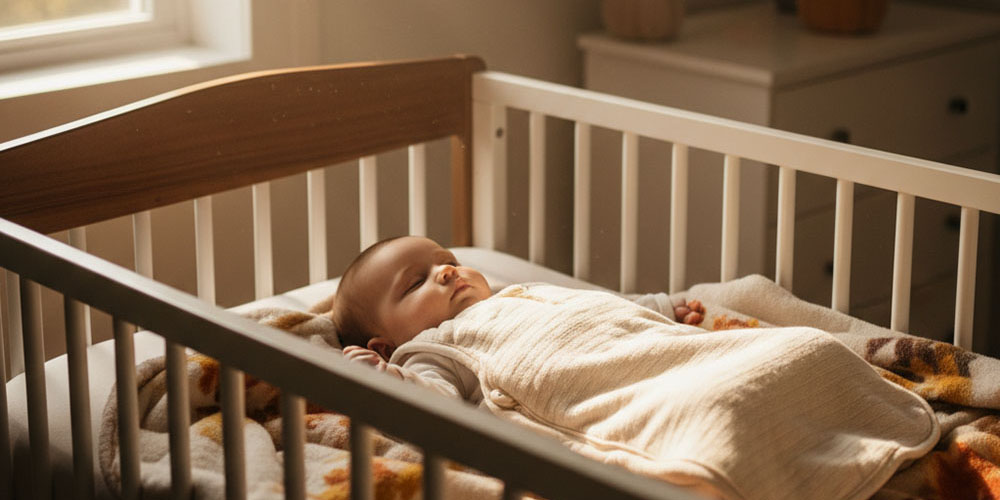You know that feeling when the clocks change and suddenly everyone’s waking earlier, crankier, and somehow hungrier?
Baby sleep in autumn can be a tricky one – not just for us, but for our little ones too.
Darker mornings, colder nights, and endless sniffles can send even the best sleepers into chaos.
If bedtime’s turned into a battle or baby waking early as the darker mornings has crept back in, you’re far from alone.
This happens to so many families at this time of year.
The good news? A few gentle tweaks can make a world of difference.
Let’s talk about why autumn sleep goes sideways – and how to get things back on track before winter truly sets in.
Why Autumn Messes With Baby Sleep (It’s Not Just You)
There’s a reason everyone feels a bit “off” when the seasons change.
Shorter days and longer nights mess with our internal clocks – and babies’ body clocks are even more sensitive than ours.
When mornings stay dark later and evenings draw in early, your baby’s natural rhythm (their circadian rhythm) gets confused. You might notice they start waking too early, fighting bedtime, or taking longer to settle.
Then there’s the temperature drop. A baby who was cosy in summer might now be waking because they’re cold, especially in the early hours when room temperatures dip.
Add in seasonal sniffles, teething flare-ups, and less time outdoors, and you’ve got the perfect storm for disrupted sleep.
None of this means you’ve “lost” your routine – it just means it needs a little seasonal fine-tuning.
What’s Actually Going On in Their Little Body
Here’s the science bit – made simple.
Our bodies rely on light exposure to regulate sleep hormones like melatonin. In summer, bright morning light tells your baby’s brain, “It’s time to wake up!”. In darker months, that signal gets weaker, which can make their body clock drift earlier or later.
Colder air also plays a role. Babies under 12 months can’t regulate their body temperature as well as adults, so even small temperature changes can cause restlessness or early waking.
And if naps are off – shorter days often mean less predictable naps – overtiredness builds up, making nights even trickier.
So if your baby’s suddenly harder to settle, it’s not “bad habits”. It’s biology.
Small Changes That Make a Big Difference
Luckily, you don’t need to overhaul everything. A few simple shifts can help your baby’s body adjust naturally to the new season.
1. Reinforce daytime light
Get outside as much as possible – even 20 minutes of natural daylight helps reset their body clock. Morning light exposure (especially before 10am) is like a “reset button” for sleep hormones.
2. Keep the room comfortably cool
Aim for a room temperature around 18–20°C. Too cold and your baby may wake early; too warm and they’ll struggle to settle. Use a sleep sack appropriate for the season – it’s safer and keeps temperature consistent.
3. Use light to your advantage
Keep things bright during the day and dim in the evening. If mornings are too dark, open blinds straight away to help signal “morning time". At night, avoid overhead lights – use soft lamps or red-toned nightlights to encourage melatonin production.
4. Protect naps
It’s easy to let naps slide when the days get busy or darker – but overtiredness is the enemy of good sleep. Try to keep naps roughly at the same times, even if lengths vary.
5. Add warmth and comfort at bedtime
Think warm pyjamas, a predictable bedtime routine, and maybe an extra cuddle before lights out. The emotional connection helps your baby feel secure, which supports easier settling.
Tiny changes, done consistently, really do add up.
What If Things Still Feel Off?
Sometimes, despite your best efforts, things just don’t click back into place – and that’s completely normal.
When sleep has been rocky for a while, there’s usually more going on beneath the surface.
Things like overtiredness cycles, inconsistent nap timing, or tricky sleep associations (rocking, feeding, or contact naps) can keep babies stuck in a pattern of broken sleep.
That’s where a tailored plan can make all the difference.
Through the Sleep Harmony Programme, I work with families 1:1 for three weeks to rebuild sleep gently, without leaving anyone in tears. It’s not about “training” your baby – it’s about teaching them (and you) how to rest again, confidently.
If you’ve been running on empty and can’t remember the last time you had a full night’s sleep, you don’t have to just power through. There’s a way back to balance.
A Little Reminder Before You Go…
This season won’t last forever. Your baby’s body will adjust, and so will you.
Sleep ebbs and flows, especially in those early years, but it always finds its way back with a bit of calm, consistency, and care.
You’re not doing anything wrong – you’re just in a season (literally and figuratively).
So grab your cuppa, pull the blanket up, and remember: better sleep is coming.
If you’d love a little help rebuilding your baby’s sleep routine before winter, book your Discovery Call below & we'll help you find the right baby sleep solution for you.




.jpg)


